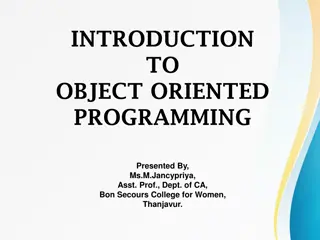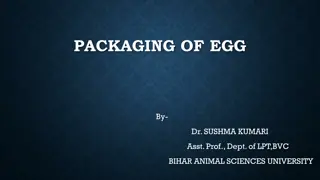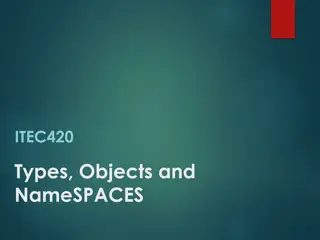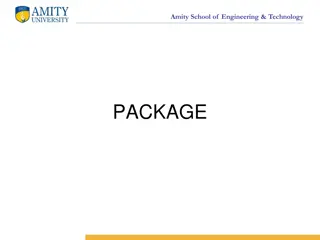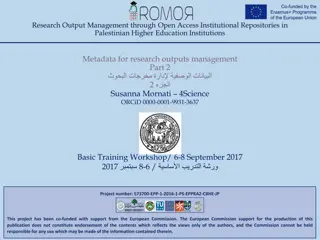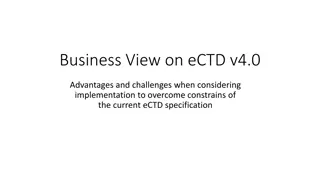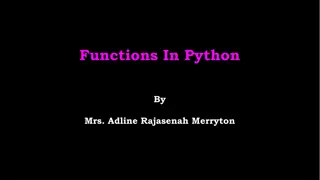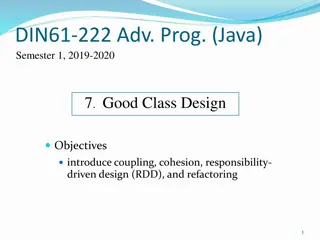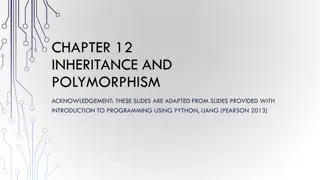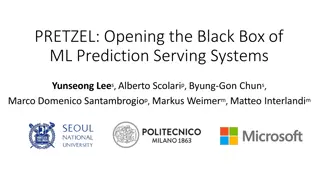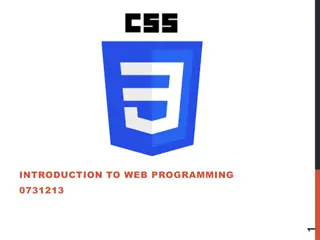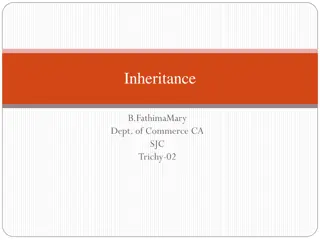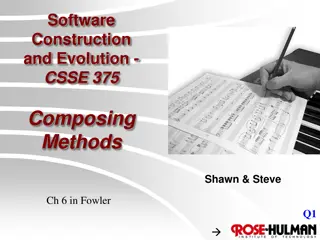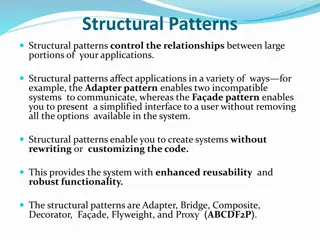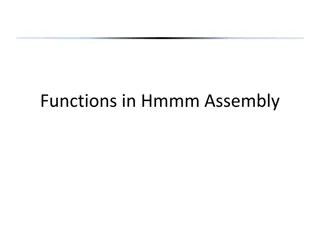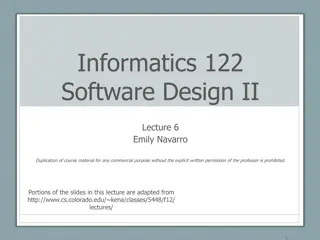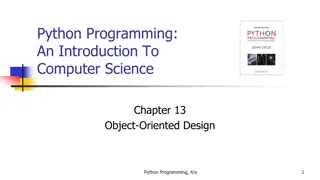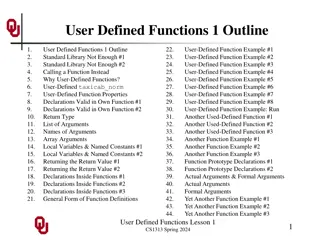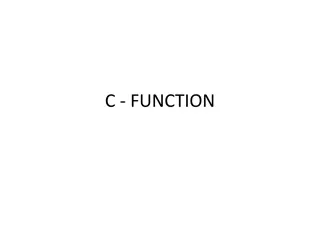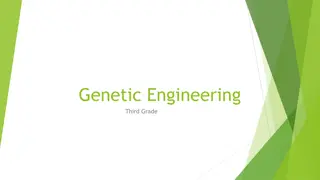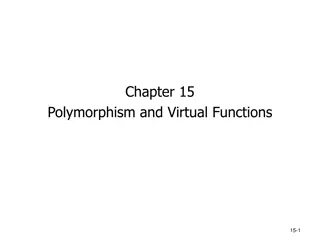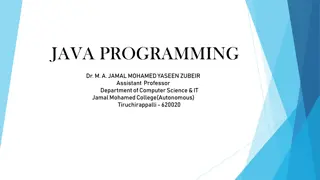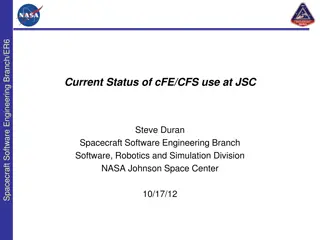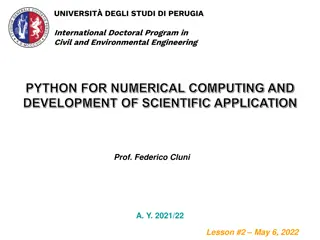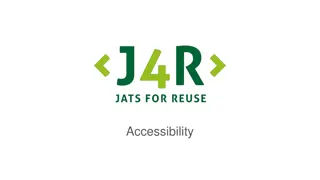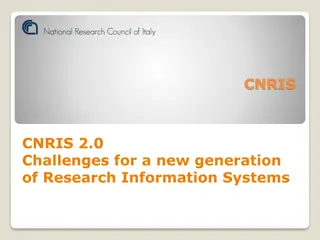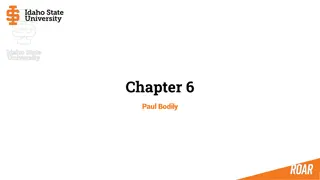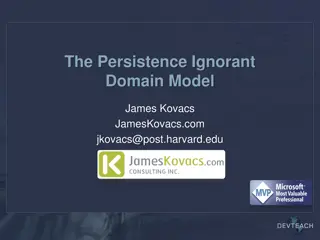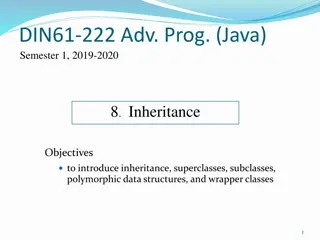Understanding Open Government Data Principles and Benefits
Open Government Data (OGD) principles and policies play a vital role in promoting transparency, citizen engagement, innovation, and data-driven decision-making in government operations. Governments worldwide are adopting open data policies to enhance accessibility, reusability, collaboration, privac
0 views • 36 slides
Certification of Core Flight Software (cFS) for NASA's Gateway Program
The project aims to certify the Core Flight Software (cFS) for NASA's Gateway program, ensuring safety-critical flight software for Gateway's modules. The certification work is led by a dedicated team, enabling cost savings across the program. The goal is to deliver a class-A certified cFS bundle wh
1 views • 10 slides
Understanding Object Oriented Programming (OOP) Principles
Object-Oriented Programming (OOP) is a software design approach where programmers define data structures and operations. Key principles include objects, classes, data encapsulation, inheritance, polymorphism, and data abstraction. OOP allows for better organization and reusability of code, fostering
0 views • 15 slides
Packaging of Eggs: Types, Factors, and Methods
Egg packaging is crucial to prevent shell damage and ensure product quality during storage and transportation. Factors affecting packaging include quality maintenance, storage facilities, transport type, distance traveled, climatic conditions, and costs. Various methods, such as using filler trays a
2 views • 10 slides
Understanding Classes and Objects in Programming
In programming, classes are fundamental building blocks that define the structure and behavior of objects. Classes contain properties, methods, and events that allow interaction between objects. Objects are instances of classes, created using the `new` keyword. Classes help organize code, encapsulat
0 views • 29 slides
Understanding Java Packages and Their Importance in Programming
An exploration of Java packages, their role in structuring code, organizing classes, and enhancing code reusability. Learn about built-in and user-defined packages, the Java API's package organization, and the different types of packages available in Java programming. Discover how packages help in c
2 views • 18 slides
Understanding Transport Layer Security (TLS)
The lecture discusses key security properties essential for secure communication in computer networks, such as confidentiality, integrity, authentication, and non-repudiation. It elaborates on cryptographic mechanisms for achieving these properties and emphasizes modularity and reusability in implem
1 views • 26 slides
Research Output Management in Higher Education: Metadata and FAIR Principles
Research in higher education focuses on metadata and FAIR principles for effective research output management. The content discusses the challenges related to metadata standardization and the importance of data findability, accessibility, interoperability, and reusability in scientific data manageme
0 views • 22 slides
Advantages and Challenges of Implementing eCTD v4.0 to Overcome Constraints
Embracing eCTD v4.0 offers advantages like harmonized rules, simplified life cycle activities, improved automation, and reusability of submitted documents. While the benefits are substantial, challenges such as evaluating cost-benefit ratios, ensuring compatibility with evolving IT systems, and adap
0 views • 5 slides
Understanding Functions in Python
Functions in Python can be built-in functions provided by Python or functions defined by the user. They enable code reusability by taking inputs, performing computations, and returning results. Function definition, arguments, max function, type conversions are key concepts explored in Python functio
0 views • 11 slides
Exploring Class Design in Java Programming: Coupling, Cohesion, RDD, and Refactoring
Delve into the world of Java programming with a focus on class design principles such as coupling, cohesion, responsibility-driven design (RDD), and refactoring. Understand the importance of good design for code quality, ease of debugging, maintenance, and reusability. Dive into the adventure of Zuu
0 views • 39 slides
Understanding Inheritance and Polymorphism in Python
Exploring the concept of inheritance in object-oriented programming, specifically in Python, to create a hierarchy of classes where subclasses inherit attributes and methods from a superclass. This approach helps to avoid redundancy and promotes code reusability. The relationship between superclasse
0 views • 11 slides
Explore the Extend Language for Declarative Programming
Unveil the Extend language, inspired by the restrictions of spreadsheets, offering a declarative programming approach for reusability. Dive into its basic architecture, lazy evaluation of values, variables handling, and syntax for list comprehensions. Discover its current project status, spanning ov
3 views • 19 slides
Understanding SharePoint Development with Becky Bertram
Delve into the world of SharePoint development with expert Becky Bertram as she covers SharePoint features, solutions, development tools, Visual Studio 2010 integration, and various ways to interact with SharePoint. Explore the concept of features in SharePoint, their scopes, reusability, and activa
2 views • 29 slides
Unveiling the Black Box: ML Prediction Serving Systems
Delve into the world of Machine Learning Prediction Serving Systems with a focus on low latency, high throughput, and minimal resource usage. Explore state-of-the-art models like Clipper and TF Serving, and learn how models can be optimized for performance. Discover the inner workings of models thro
0 views • 30 slides
Introduction to Web Programming: Styling HTML with CSS
Styling HTML with CSS is essential for controlling the layout and design of web pages. CSS offers advantages like flexibility, reusability, and easier maintenance but also has drawbacks such as varying browser support. Learn about naming HTML elements, adding style via CSS, and attaching CSS files t
0 views • 34 slides
Evolution of Separate Compilation and Linking in Computing
Separating compilation and linking processes has been crucial for code reusability and program efficiency in computing history. From the early days of manually recalculating addresses to modern linkers and library routines, the evolution has revolutionized how programs are developed and executed on
0 views • 17 slides
Understanding Inheritance in Object-Oriented Programming
Inheritance is a fundamental concept in C++ that allows for the creation of new classes based on existing classes. This enables code reusability, organization, and the implementation of a hierarchical structure in programming. By using inheritance, developers can efficiently model relationships betw
0 views • 20 slides
Refactoring Methods for Composing Code in Software Construction
Explore the key concepts of refactoring methods for composing code in software development. Learn about techniques such as Extract Method and how they can improve code readability, maintainability, and reusability. Understand the process of creating well-named methods and optimizing code structure f
0 views • 23 slides
Understanding Structural Patterns in Software Design
Structural patterns play a crucial role in controlling the relationships between different parts of applications, enabling compatibility between systems and simplifying user interfaces. Key patterns like Adapter and Bridge facilitate communication and modular design, enhancing reusability and functi
0 views • 59 slides
Understanding Functions in Programming Languages
Functions in programming serve as blocks of computation that allow for code reusability and organization. They enable modularity and help simplify complex tasks by breaking them down into smaller, manageable parts. This article explores the significance of functions in programming through examples i
0 views • 8 slides
Understanding Template Method Design Pattern in Software Design
Today's lecture covers the Template Method design pattern in software design, focusing on defining the pattern, its structure, and providing an example with Tea and Coffee recipes. The pattern allows subclasses to redefine certain algorithm steps without changing the overall structure, promoting cod
0 views • 40 slides
Understanding Object-Oriented Design in Python Programming
Object-Oriented Design (OOD) is a fundamental concept in modern computer applications. It involves structuring systems as black boxes with interfaces, allowing for the encapsulation, polymorphism, and inheritance. OOD separates the implementation details from the user, enabling the design of complex
0 views • 189 slides
Understanding MVC Framework: An Overview
MVC (Model-View-Controller) architecture separates an application into three key components – model, view, and controller. This pattern enhances code reusability, separation of concerns, and business logic organization. Explore the fundamental concepts, components, and communication within MVC for
1 views • 32 slides
Understanding Functions in C Programming
Introduction to C programming functions covering topics such as program modules, function definitions, prototypes, storage classes, scope rules, recursion, and more. Explore the benefits of modular programming, divide and conquer strategies, and the use of existing functions for software reusability
0 views • 32 slides
Understanding User-Defined Functions in Programming
Explore the significance of user-defined functions in programming by learning how they can optimize code reusability and simplify complex tasks. From creating custom functions to calling them, discover the power and flexibility they offer in enhancing code efficiency.
1 views • 44 slides
Understanding C Functions
C functions are independent blocks of code that perform specific tasks when called, enhancing reusability and understandability in programming. This article covers topics such as C function declaration, return values, parameters, and function definitions in detail, offering insights into how functio
0 views • 92 slides
Understanding Nucleic Acid Blotting: Southern Blotting Techniques
Nucleic acid blotting techniques, including Southern blotting, are crucial for transferring DNA, RNA, and proteins for analysis. Southern blotting, developed by Edwin Mellor Southern, is used to probe specific DNA sequences, aiding in applications such as gene isolation, DNA fingerprinting, and dise
0 views • 11 slides
Understanding FAIR Principles in Biomedical Research
The FAIR principles - Findable, Accessible, Interoperable, and Reusable - provide a framework for ensuring scientific data in biomedical research is managed and shared effectively. This informative session delves into the theory and practice of FAIR principles, emphasizing the importance of data qua
0 views • 28 slides
Understanding Polymorphism and Virtual Functions in C++
Polymorphism and virtual functions play a key role in C++ programming, allowing for flexibility and extensibility in code through type compatibility, type casts, pointers, inheritance, and overridden functions. By leveraging these concepts, developers can create efficient and maintainable code struc
0 views • 34 slides
Fundamentals of Object-Oriented Programming in Java
Object-Oriented Programming (OOP) is a methodology that simplifies software development by using classes and objects. This paradigm includes concepts like Object, Class, Inheritance, Polymorphism, Abstraction, and Encapsulation. Other terms used in OOP design include Coupling, Cohesion, Association,
0 views • 54 slides
Overview of Spacecraft Software Engineering Branch Activities
The Spacecraft Software Engineering Branch at NASA's Johnson Space Center (JSC) focuses on developing and implementing critical software for spacecraft systems. Their work includes utilizing the core Flight Executive (cFE) and Core Flight System (CFS) for various projects, such as the Morpheus lande
0 views • 10 slides
Python Functions for Numerical Computing and Scientific Applications
Functions in Python allow for effective code organization and reusability. This lesson covers defining functions with default values, handling multiple arguments, and advanced argument passing techniques. Examples include doubling a number, calculating sum and difference, and processing lists and di
0 views • 21 slides
Understanding Inheritance in Object-Oriented Programming
Inheritance allows a class to inherit properties and characteristics from another class, promoting code reusability and reducing duplication. It is a fundamental feature in Object-Oriented Programming that enhances modularity and scalability by structuring classes hierarchically. Different modes and
0 views • 50 slides
Enhancing Scholarly Content Reusability through Accessibility in JATS XML
Explore the importance of accessibility in JATS XML for scholarly content reusability. Understand the significance of meeting accessibility recommendations, implications for different reader groups, and the impact on creating accessible documents in various formats. Delve into key questions guiding
0 views • 27 slides
Challenges and Solutions in Research Information Systems
Research information systems face challenges in interoperability, data reusability, and organization. To address these, adopting standard metadata formats, authority files, and persistent identifiers is crucial. Implementing standard interfaces, data quality control, and certification are essential
0 views • 22 slides
Enhancing Programming Skills: Iteration and Problem Solving in CS Course
Central concepts of iteration and problem-solving techniques in a Computer Science course are explored and valued by students in Chapter 6. Feedback highlights the effectiveness of TA support, engaging teaching methods, and practical exercises. Suggestions for improvement include better alignment of
0 views • 12 slides
Understanding Persistence Ignorance in Domain Models
Persistence Ignorance is a concept in software development where domain models do not contain any persistence-related code, focusing solely on business logic. This approach promotes separation of concerns, single responsibility, loose coupling, testability, and reusability. NHibernate and Plain Old
0 views • 8 slides
Introduction to Inheritance and Polymorphism in Java Programming
This course material covers the concepts of inheritance, superclasses, subclasses, polymorphic data structures, and wrapper classes in Java programming. It introduces the DoME example - a multimedia entertainment database, showcasing the implementation of classes like CD and DVD. The details of CD a
0 views • 54 slides
Enhancing Data Reusability: Challenges and Strategies
The WDS/RDA Assessment of Data Fitness for Use Working Group addresses common challenges faced by researchers in utilizing data from repositories, emphasizing the importance of comprehensive assessment and reliability. The focus is on improving the reusability of datasets by ensuring they meet quali
0 views • 43 slides


